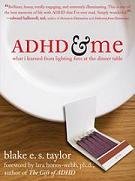ADHD & Me: What I Learned From Lighting Fires at the Dinner Table by Blake E.S. Taylor

New Harbinger, 2007. 176 pages. ISBN: 978-1-57224-522-8
Any parent of a teen with learning problems will be encouraged to see another teen with those problems is able to write a book. How much more encouraging when it’s a well-organized, helpful book. This book is not a “Here’s how I did it” success story, but a volume that, with honesty and humor, illustrates what it means to struggle to learn to succeed.

Each of the short chapters deals with one struggle. Taylor wisely begins each chapter with a few pages of story, a scene from his life illustrating the subject of that chapter. Next, he gives a two-page summary of the problem and its effects, followed by concise advice on how to deal with the concern. The chapters cover:
- Chapter 1. Being distractible
- Chapter 2. Being impulsive
- Chapter 3. Being disorganized
- Chapter 4. Being hyperactive
- Chapter 5. Having tics
- Chapter 6. Being unpopular
- Chapter 7. Being bullied
- Chapter 8. Being isolated
- Chapter 9. Being misunderstood
- Chapter 10. Being blamed
- Chapter 11. Being rigid
- Chapter 12. Being disobedient
- Chapter 13. Being discriminated against
- Chapter 14. Taking control
- Chapter 15. Being gifted
I’m impressed by the wisdom the young author often shows. For instance, in his chapter on being blamed for things you didn’t do, he suggests when it may be good to bring another adult in to help you present your case to other adults. He wants his readers to “know that sometimes it’s just not fair.” Disputes aren’t always resolved justly.
Is this book for your teen or you?
Other things to help you decide if this book is for you or your student.
- This author was never homeschooled. Nearly every chapter mentions teachers or school, but the principles in dealing with these adults and situations are applicable to homeschool situations as well. ADHD & Me will be particularly helpful to homeschooled teens who are beginning to take charge of their schoolwork, take jobs and have other involvements with other adults through community activities and classes.
- The author mentions taking medication for his ADHD. He does not claim that prescriptions cure ADHD, but this young man clearly believes it has helped him.
- Taylor is frank about his occasional urges to break rules (e.g. while learning sailing, he longed to sail beyond the bounds set by his sailing school). He describes how he got into trouble and how to deal with those urges to flout the rules.
- This book is not told in chronological order. Each chapter’s subtitle highlights the incident that opens the chapter and tells the author’s grade when it occurs. You’ll jump from second grade to tenth, to preschool, and so on.
- This author reflects our broader culture, with situations common to many children. His parents are divorced, his family moves across country from beloved grandparents when he is young, his mother works.
- Taylor’s family is affluent. His mother is an IBM executive, and he has a nanny caring for him and his sister. They can afford to hire a trainer at a gym to help him get started on an exercise regimen.
The last chapter makes the case that ADHD is a gift, not a disability, a controversial view that I think misstates a related truth. Taylor and I both think the hyperactive toddler can be come an energetic, productive adult. He links impulsivity and distractibility with innovation. I do not. I share Taylor’s wish to encourage teens to cultivate their gifts, I don’t think there is a definite link between gifts and ADHD. I believe people with ADHD have gifts and need to develop them, working on ways to compensate for their difficulties.
That said, I think Blake Taylor has written a good book, with humor, clarity, and honesty. He is achieving his goal of helping other teens.


I love this book, and have been recommending it for years. I had a kindergartner in my class one year who had such severe ADHD that he was already on meds. (He needed them, too — the days that life with two parents in residency at Stanford got hectic and the meds were forgotten, it was easy to tell!) His Dad told me about this book. The best part is that he lets other kids with ADHD know they are not alone, which is so important. And he gives well-meaning adults plenty to think about.
Karen, thanks for your comment. While ADHD meds can be overprescribed, for some students they are a lifesaver. One of my best math students ever found math terribly frustrating until her doctor and parents eventually found the right prescription and dosage. Freed to focus, she excelled and went on to major in math in college!
Medication doesn’t help everyone, and it didn’t make this student like math! (It also doesn’t teach organization skills.) But in this case, the right medication and dosage let my student focus her excellent mind and use her considerable talent. It can take time to find the right medication and dosage.